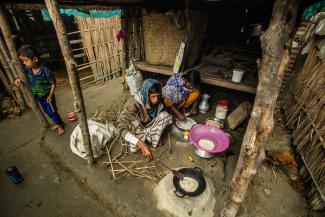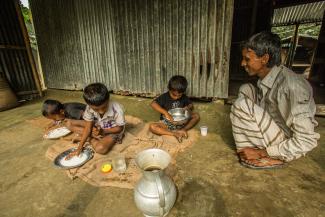Monjuara's Dream
A resilient mother’s road to leadership
Photos and video by Morgana Wingard and Josh Estey for USAID
April 2016
Struggle to survive
Monjuara is a 27-year-old mother with three sons from Sirajganj, Bangladesh. In her beautiful village near the Brahmaputra River, life was often hard. And putting food on the table was not always easy.
Her family did not own enough land to earn income from agriculture like some of her neighbors. Nor did they own livestock that could support them. “I was very worried about my children’s future,” she says. “Each day was a struggle to survive.”


Things began to change in 2011 when Monjuara became a member of the village development committee—an informal association of villagers that supports the community's social and economic development. She was chosen by her neighbors because of her energy and desire to improve the lives of everyone around her.

She also started poultry farming.
“My ducks and chickens lay eggs, some of which I sell,” she says. “I also feed the eggs to my children, and I eat some myself.”
Soon she had enough money to buy a goat—and then a cow.




Monjuara used to worry about her children’s health. Her oldest son was underweight. After she learned about feeding her children vegetables and protein-rich food and implemented the practice at home, her sons’ health improved. “Now I am ahead in every way,” says Monjuara.
Disease nearly gone
Hygiene lessons like washing hands with soap also kept her children from getting sick.
“I didn’t know much about health,” she explains. “Now,” she says, “disease and germs are nearly gone.”

A new partnership
She applied her new skills in agriculture with the help of her husband.
They started growing a variety of crops, including corn and spinach, on the small amount of land they were able to lease.
In their courtyard, they also planted papaya and other fruits and vegetables.


“Now I am empowered”
Monjuara’s husband saw how the family prospered from Monjura’s agricultural prowess, and he began taking over some of her household chores.
While she worked, he helped with the cooking and cleaning, and started looking after the children.
“Now I am empowered,” says Monjuara.



Today, Monjuara is still working for her community.
She makes sure that pregnant women in her village are attending their regular check-ups, receiving proper nutrition and taking their medicine properly.
Monjuara often accompanies her neighbors to the local community clinic because they trust her judgment.
More resilient, better prepared
Monjuara has even found her way to the standing committee of the local sanitation, water supply and sewage board.
She helps the local government identify vulnerable people who are eligible for social safety net programs and mobilizes her neighbors to better respond to emergencies such as frequently occurring floods.



Monjuara has her sights set on a better future for her children. “When my oldest son was in my womb, I had a dream. That he would become a doctor one day, with proper education,” says Monjuara. “This is my dream. This is my target. Nothing else.”
About This Story
In Bangladesh, over 60 million people live on less than $1.25 per day. Women in rural areas without land of their own or alternate sources of income are some of the most vulnerable—often faced with poor health and nutrition.
Because of cultural norms, Bangladeshi women often find it difficult to explore roles beyond that of a housewife.
USAID’s Food for Peace programs use a number of holistic interventions across multiple sectors, such as agriculture and health, to address the root causes of hunger and poverty.
They also address gender inequalities and promote an environment where women and men are equally respected.
Since 2010, USAID’s Food For Peace program in Bangladesh has reached over 3.5 million poor and vulnerable people like Monjuara and helped improve incomes by 90 percent in targeted areas.
What’s more, these programs teach Bangladeshis ways to overcome common and recurrent shocks such as floods and food price hikes, strengthening their resilience.



